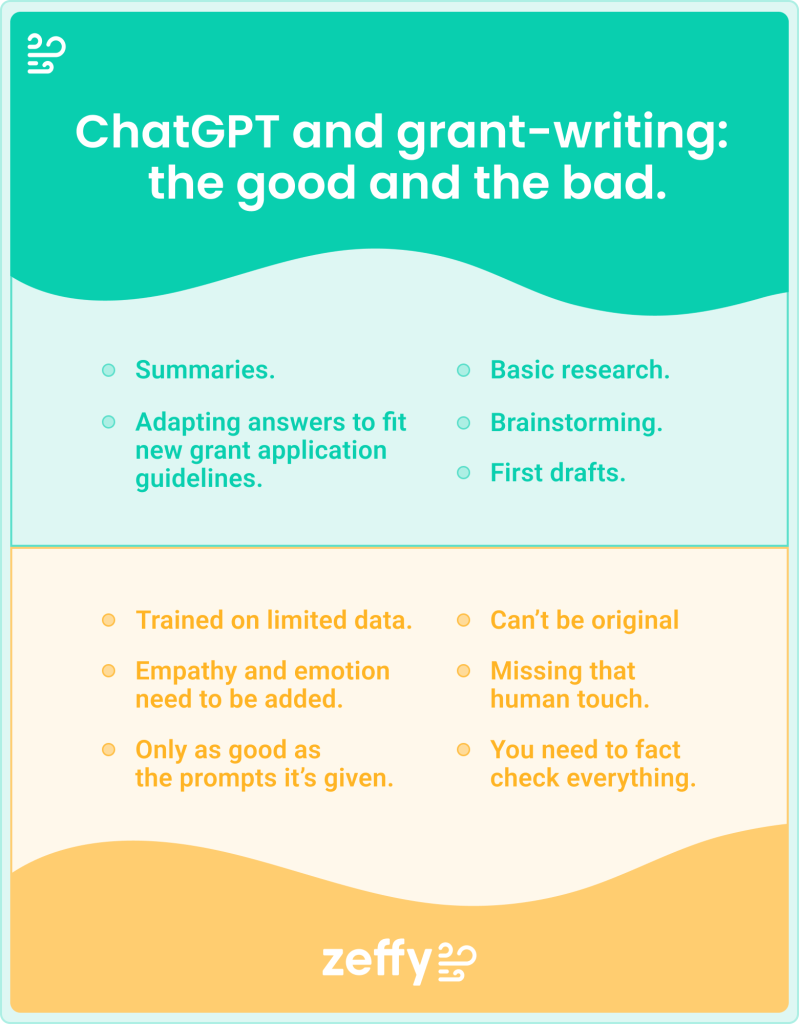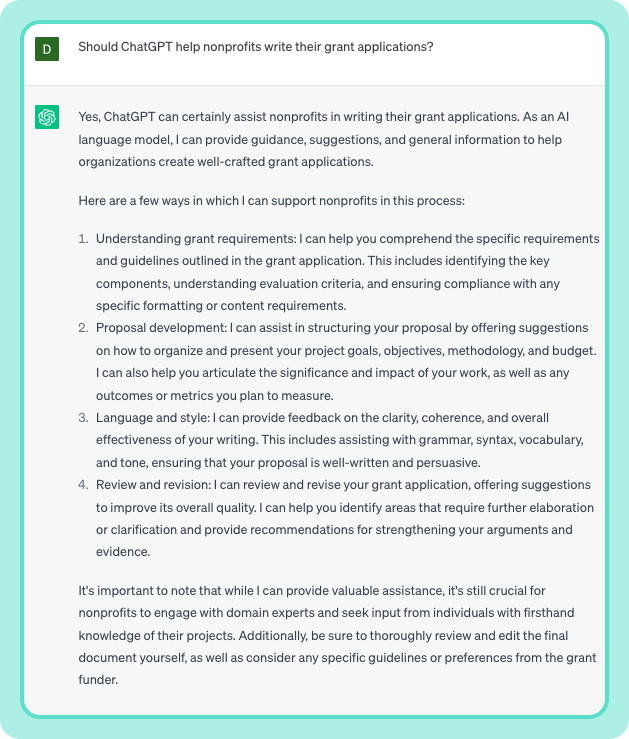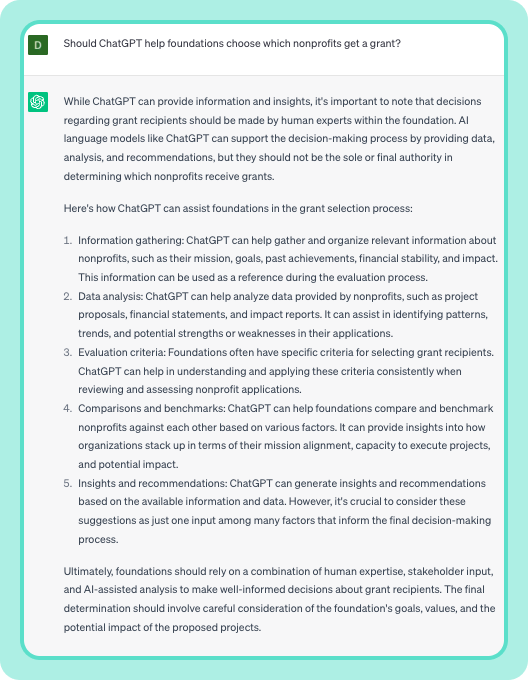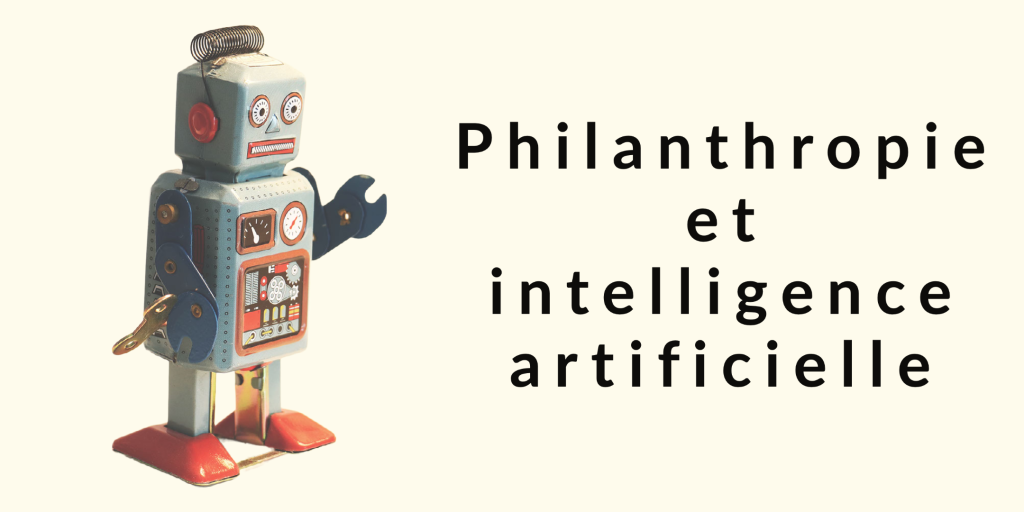If grant-writers are using ChatGPT to summarize and write, and foundations are using it to help select, what is the point of it all?

Can and should nonprofits use ChatGPT to help them write grant applications?
Can and should foundations use ChatGPT to read those grant applications?
If grant applications have become so complicated that the possibility of ChatGPT completing them is a dream come true, is there a bigger problem?
Is ChatGPT the best solution?
In this article we explore the realities of the grant application process and question whether or not ChatGPT should be able to lend a hand.
So, can ChatGPT help nonprofits write a grant application?
Yes! ChatGPT can help nonprofits with their grant applications but it can’t do everything. We’ve got a few tips that will help you help ChatGPT output the best answers it can. (You’ll still have to check its work though.)1,2

Now that we know ChatGPT can help nonprofits write grant applications. Should it?
“A good grant writer is not just a competent wordsmith; they are empathic communicators who can reach through an application and touch the hearts of the people with the money, and remind them that they want to help make the world a better place.”3
– Gary Miller, Nonprofit AF

The grant-writing and application process is not an easy one. Grant-writers have a lot to think about and even more to do, often within very tight deadlines. It’s stressful, time-consuming, repetitive, random and arguably an unnecessary use of a nonprofit’s hard-earned resources.4 (This article by Nonprofit AF is worth a read if you haven’t already read it.)
ChatGPT can’t solve all those problems, but it can help reduce the amount of time nonprofits and grant-writers spend on grant applications. And, this alone makes ChatGPT an amazing tool for nonprofits.
Just think of how grant applications are written:
- There’s all the necessary information that could be easily googled or stored in a database for easy access to avoid having to re-write everything for every grant application.
- There are the various formats and lengths that require countless hours of re-writing instead of everyone agreeing on a single format.
- There is the time spent choosing the perfect wording and presentation. Grant-writers have been conditioned and trained to tell funders exactly what they think funders want to hear—not necessarily, exactly relevant or true.5
The amount of time spent on grant applications is shocking and it’s energy that could be better spent working towards a nonprofit’s mission. So, if ChatGPT can help write and rewrite the repetitive parts of a grant application, we think it should.
“A grant that’s for $20,000 that takes a nonprofit on average 10 hours to apply for. 10 hours for 20K is not bad, right? But let’s say that 100 organizations applied, and only 5 are selected. This means that 95 organizations wasted a collective 950 hours. Multiply this by thousands of other grants across the sector, and we pour millions of hours down the drain every single year.”3
– Gary Miller, Nonprofit AF
Another stat (Full transparency: it’s based on data from the UK.): 46% of grants cost more than they’re worth.6 When you take into account how many hours are spent applying to them, reading them, and the average salaries of the people writing and reviewing the grants, smaller grants, from a monetary perspective, take too much time.6
So, arguably, a tool like ChatGPT that can help grant-writers save time (and nonprofits save resources) by reducing the energy spent on research, first drafts, and rewrites is a good thing. Grant-writers will still be needed to add context, emotion, tone and finalize it all—but less time will be spent re-writing the same answers to the same questions in four or five different formats to appease the inconsistent structure of grant applications.
Should foundations use ChatGPT to help filter the grant applications nonprofits submit?
If grant-writers and nonprofits can use ChatGPT, it’s only fair that foundations be able to use it to help them select from the 100s or 1000s of grant applications nonprofits send them every year.
A lot of the arguments that apply to nonprofits also apply to the foundations managing the grants. So, for smaller grants, using ChatGPT (or other AI tools) makes sense in terms of saving time and money.
The question is: how good will ChatGPT be at sifting through and pre-selecting grant applications? Will it be able to interpret the context and emotion in every application? Will it be able to make valuable connections? For now, AI programs like ChatGPT are trained mostly with what is found on the internet and, in ChatGPT’s case, only up to the year 2021. And, as we know, the internet isn’t exactly a beacon of truth and this has made ChatGPT biased and untrustworthy.
AI are humbled by quite a few biases, but the relevant ones for our discussion are:
- Sample bias: Only a few of us have actually contributed content that feeds the AI’s language models. This means what we find on the internet is a partial/poor representation of the real world. So, ChatGPT only has a part of the knowledge it needs.
- Morality bias: Because AI can’t correct itself, the companies controlling them inject them with opinions that lean towards being socially correct. This is probably better than doing nothing, however it is still, by definition, a bias.
- Ignorance bias: ChatGPT can quickly look up existing answers, but it lacks the cognition needed to tackle new questions. This is a problem because most of us don’t realize that ChatGPT can’t output anything new.
- Automation bias: This happens when we, the humans, over-rely on the validity of the technology. By putting too much trust in AI, we are giving it permission to double down on its bias and accepting those biases.7

While it’s relatively easy to clean up offensive content (OpenAI, ChatGPT’s parent company, does it by hand), it’s much harder to correct biases that are embedded in the AI’s learning model. Which means, if we’re not careful, we will be stuck in a kind of loop that ends in 2021 and constantly reinforces our past knowledge base without allowing for anything new.
While the question of whether or not foundations give solely based on need or rationality is a discussion for another article, we can’t ignore the inherent bias of ChatGPT and its inability to consider emotion, newly developed ideas and needs, and the multiple layers of a grant application.
However, biases aside, foundations can, for example, train AI to help sift through applications that don’t meet the basic criteria of the grant or that have failed to fill out the grant application properly.8
Maybe there’s a problem with the whole grant application process.
“The world of philanthropy, within which thousands of not-for-profit organizations spend more than half their time, energy, and money competing with one and other for foundation grants, is another opportunity. In many cases, such organizations burn up more than three-quarters of their gifts from individuals soliciting more. The foundations that make the grants routinely spend eight to ten percent of the money they have available in processing grant requests. Thus, at least 60 percent of philanthropic resources are consumed in “the doing of the doing” and never get near the people for whom they intended to do good.”
– Dee Hock, One From Many: VISA and the Rise of Chaordic Organization
Not much in this world is perfect, grant applications included. And, like most imperfect things there’s usually more than one way to improve it.
Dee Hock, the man and mind behind VISA and the chaordic organization, argues that the fragmented nature of nonprofit organizations and the foundations that help fund them is preventing their growth and success. He claims that “The world of philanthropy and nongovernment organizations cries out for an enabling organization within which cooperation and competition can be blended, resources efficiently used, values harmonized, and unified voices merged.”
But, until then, when used as a tool, ChatGPT can help make the grant application process more manageable. Especially for small to medium sized nonprofits applying for small and medium sized grants. And, once you learn which questions to ask and how to ask them, ChatGPT can help you and your nonprofit with a lot more than just the grant application process—whether it’s your first time applying for a grant or you’re a seasoned veteran.
About Zeffy:
Zeffy is the only zero-fee fundraising software for non-profits. Financed by the generosity of donors and their voluntary contributions, Zeffy is breaking the mould. While other software claims to be free, they all pass on the transaction (credit card) fees to the non-profits. Zeffy’s mission is to support the mission of the organizations that rely on us by empowering nonprofits to change the world—no fees attached.
Cet article fait partie de l’édition spéciale de juillet 2023: Philanthropie et intelligence artificielle. Vous pouvez trouver plus d’informations ici.
Sources:
- How to Generate Compelling Grant Proposals with AI-powered ChatGPT.
- ChatGPT for Nonprofits: How to Leverage Artificial Intelligence.
- Four Ways ChatGPT Can Help a NonProfit Grant Writer.
- Foundations, it’s time to stop using grant applications to distribute funding.
- Grant writing honest responses.
- 46% of grants cost more than they’re worth.
- Uncovering The Different Types Of ChatGPT Bias.
- What is the percentage of grant proposals that foundations actually fund?
Other sources:


